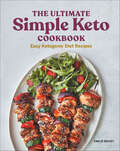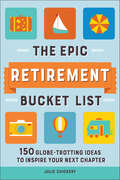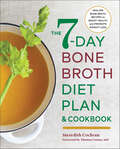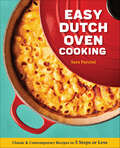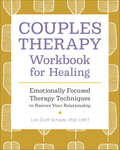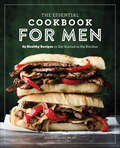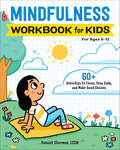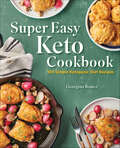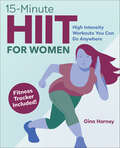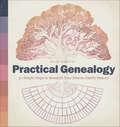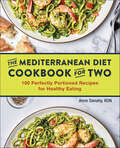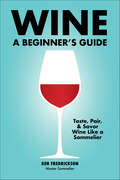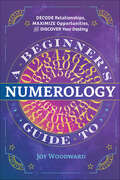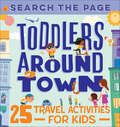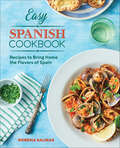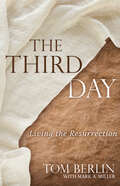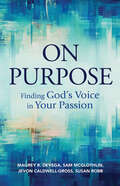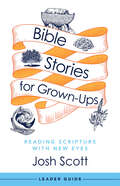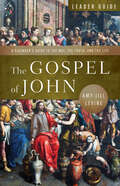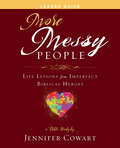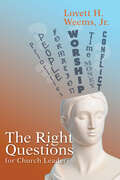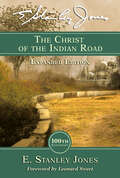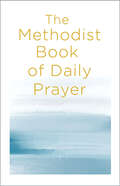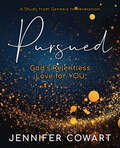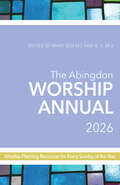- Table View
- List View
The Ultimate Simple Keto Cookbook: Easy Ketogenic Diet Recipes
by Emilie BaileyTruly easy keto recipes for your busy lifeUnlock the secrets of fast and healthy ketogenic meals. The Ultimate Simple Keto Cookbook shows how appetizing and effortless the keto diet can be. Discover simple keto recipes that cook up using just one pot or pan—or don't need to be cooked at all. Some of the recipes use only 5 ingredients or less, and many take 30 minutes or less. Each recipe includes macro percentages and nutritional info, making this cookbook the perfect keto companion on the journey to better health.Eat well every day with simple keto recipes like:Blue Cheese-Cucumber Bites—Buttery gorgonzola pairs perfectly with crunchy toasted walnuts for a sinful bite atop fresh cucumber slices.Garlic Cheddar Biscuits—No need to give up warm, buttery biscuits—this recipe satisfies cravings and avoids all the extra carbs by using almond flour.Creamy Zucchini-Poblano Soup—Zucchini and sweet, fruity poblano peppers pair beautifully with smoky cumin in this simple keto soup.Lemon-Basil Chicken—The aromatic combination of lemon and basil adds a gourmet touch to these easy marinated and grilled chicken thighs.Find accessible new ways to enjoy low-carb foods with this simple keto cookbook.
The Epic Retirement Bucket List: 150 Globe-Trotting Ideas to Inspire Your Next Chapter
by Julie ChickeryMake your retirement an unforgettable adventure using this inspiring guide so you'll never run out of creative ways to make your next phase your best phase.Welcome to retirement! Life beyond the working world is full of opportunity and excitement—but figuring out exactly where to go and what to do can be tough. Explore the unknown—Choose from 150 outside-the-box ideas and hobbies, whether it's swimming with sharks in the Maldives, learning the art of cheesemaking in the Swiss Alps, or volunteering at a community garden.Cover the globe—Book your trip, pack your bags, and travel the world with a list of destination activities on every continent.Get trustworthy guidance—Come prepared with insider knowledge about what to see at each destination, how to enjoy local activities, and where to eat while you're there.Make your retirement an unforgettable adventure with The Epic Retirement Bucket List!
The 7-Day Bone Broth Diet Plan & Cookbook: Healing Bone Broth Recipes to Boost Health and Promote Weight Loss
by Meredith CochranTake weight off fast with the nutrient dense cleanse from The 7-Day Bone Broth Diet Plan.Bone broth diets have been praised by The New York Times and ABC News as an effective way of losing weight without losing the essential vitamins and minerals your body needs. In The 7-Day Bone Broth Diet Plan, co-founder and CEO of the all-natural bone broth company Osso Good, Meredith Cochran, combines flavorful bone broth recipes with an actionable one-week plan to slim down and boost your immune system. Paving the way to lasting weight loss and long-term wellness, The 7-Day Bone Broth Diet Plan equips you with a gut-healing, waist-trimming plan for feeling good.The 7-Day Bone Broth Diet Plan offers:A One-Week Meal Plan helping you start and stay on track from breakfast until dinner with an easy-to-follow routine25 Flavorful Bone Broth Recipes providing simple-to-follow recipes designed for your stove top, slow cooker, or electric pressure cooker75 Bonus Bone Broth Recipes making sure you continue to get your fill of bone broth with beverages, soups and stewsFrom Bison Bone Broth to Bone Broth Burgers and Paleo Pork Ramen, The 7-Day Bone Broth Diet Plan serves up a straightforward weight-loss program that you can start and stick to.
Easy Dutch Oven Cooking: Classic & Contemporary Recipes in 5 Steps or Less
by Sara Furcini100 Classic and modern recipes to fall in love with your Dutch ovenWith all the fancy new cooking gadgets on the market, it's easy to overlook trusty old-timers like the Dutch oven—but they're durable, simple to use, and cook just about anything. Easy Dutch Oven Cooking is the perfect Dutch oven cookbook to help you get the most out of this awesome piece of cookware—with 100 easy-to-follow, delicious recipes.With simple techniques for everything from poaching eggs and baking casseroles to sautéing veggies, this Dutch oven cookbook offers tasty recipes with minimal prep and cleanup time. Cook up dishes like Sesame Ginger Soba Noodle Salad, Beef Stroganoff, Roast Whole Chicken over Radishes, Coconut Shrimp, Olive Bread, and more. Find out how to care for your Dutch oven, and learn pro tips like preheating and using the right utensils.Inside this essential Dutch oven cookbook, you'll find:Go Dutch—Meet the Dutch oven, find details on the different types and sizes, and discover a variety of different cooking techniques.100 Convenient recipes—This Dutch oven cookbook uses easy-to-find ingredients with recipes that take no more than five steps—many cook up in just 30 minutes or less.Helpful labels—Each recipe in this Dutch oven cookbook is listed as a classic or a new twist on a longtime favorite and includes handy dietary labels.With the simple recipes in this Dutch oven cookbook, you just might have discovered your forever pot.
Couples Therapy Workbook for Healing: Emotionally Focused Therapy Techniques
by Lori Cluff SchadeStop fighting and fall back in love, starting today If you and your partner are struggling to communicate and connect, you are not alone. The Couples Therapy Workbook for Healing is a helpful toolkit containing expert advice and activities to help both of you cultivate stronger attachment bonds and greater relationship satisfaction through Emotionally Focused Therapy.Emotionally Focused Therapy (EFT) is built on practical, concise steps for recognizing and disrupting negative behavior patterns. This couples therapy workbook uses those principles to help you develop the tools to approach your relationship with curiosity, open-mindedness, and readiness to speak, listen, and heal.The Couples Therapy Workbook for Healing includes:A three-part process—Organized to follow the process of EFT, this couples therapy workbook begins by identifying the distress in your relationship, then navigating the emotions that are causing it, and moving toward positive, long-term change.Explore your relationship—This couples therapy workbook offers insightful questions, revealing exercises, self-assessments, and even case studies from other couples who have had success with these techniques.Beyond EFT—You'll also learn about the different ways people form attachments, the power of intimacy and vulnerability, and ways to savor your best moments.If you're looking to reconnect emotionally and overcome relationship obstacles, The Couples Therapy Workbook for Healing can help.
The Essential Cookbook for Men: 85 Healthy Recipes to Get Started in the Kitchen
by Manuel VillacortaSlice and dice your way to good health with this beginner-friendly cookbook for menIf your experience in the kitchen is limited, cooking can seem like a daunting task. Tackle it head on with The Essential Cookbook for Men. Discover just how easy and satisfying it can be to create healthy, flavorful meals for less than the cost of takeout.What sets this cookbook apart from other cookbooks for men:Mouthwatering recipes—With easy-to-follow instructions, you'll start making delicious dishes like sweet and savory Pineapple Roasted Pork Sandwiches, decadent Warm Chocolate Banana Peanut Butter Smoothies, or hearty Beef Vegetable Stir-Fry.Beginner's gear guide—From skillets to storage containers, get an overview of the essential tools you'll need to successfully start searing, roasting, toasting, and more.Shopping simplified—Take the guesswork out of grocery shopping with a rundown of pantry staples, advice on pulling together a shopping list, and suggestions for how to save at the store.Practical tips and tricks—Grow your confidence in the kitchen with cooking tips on everything from how to properly measure ingredients to how to handle leftovers.Become the master of your culinary domain and create delicious, nutritious dishes with The Essential Cookbook for Men.
Mindfulness Workbook for Kids: 60+ Activities to Focus, Stay Calm, and Make Good Choices (Health and Wellness Workbooks for Kids)
by Hannah ShermanFun activities to help kids ages 8 to 12 learn mindfulnessMindfulness can help kids overcome challenges, take care of big feelings, and learn from their experiences and the world around them. This book about mindfulness for kids provides fun exercises and easy strategies to help your child find focus, develop coping skills, and handle tough situations.Kids will start their mindfulness journey with practical tools that help them act with kindness toward themselves and others, live with greater positivity and joy, and deal with common issues like impulsiveness, anxiety, and concentration.This mindfulness workbook for kids includes:Intro to mindfulness—Explore what mindfulness is, how it can benefit kids, and simple ways to tune in to thoughts and feelings.Calming exercises—Discover more than 60 engaging mindfulness activities that encourage movement, meditation, breathing, and introspection.A range of topics—Take a deep dive into topics like staying calm in tough situations, working with worries, making good decisions, showing compassion, and starting and ending the day on a positive note.Empower kids with mindfulness tools that will benefit them for their entire lives with the Mindfulness Workbook for Kids.
Super Easy Keto Cookbook: 100 Simple Ketogenic Diet Recipes
by Georgina BomerEasy, weeknight-friendly keto recipes for the whole familyEating keto for every meal can be challenging, especially if you're pressed for time or feeding a full household. This dinner cookbook relieves the stress with 100 delicious keto meals that come together with minimal effort. Keep your culinary repertoire fresh with a variety of flavorful dishes that everyone will love.Make keto easy with a dinner cookbook that includes:A keto kitchen crash course—Brush up on the basics of keto, and find a list of the most essential ingredients and equipment to keep on hand.Easy cooking methods—Pick meals that fit your schedule with a dinner cookbook of dishes organized by convenience: 30 minutes or less, 5 or fewer ingredients, one pot, slow cooker, and more.Something for everyone—Find options for a range of dietary needs, plus advice on what you can prep ahead of time and how to adjust recipes for picky eaters.Discover a dinner cookbook that makes keto cooking a simple part of your routine.
15-Minute HIIT for Women: High Intensity Workouts You Can Do Anywhere
by Gina HarneyHigh intensity exercise, low time commitment—interval training for every womanTo crush your fitness goals, you don't need a gym membership, hours of free time, or complex equipment. Do it all with 15-Minute HIIT for Women, your essential guide to simple high intensity interval training workouts that you can do anywhere in just 15 minutes. These HIIT exercises can increase your strength, stamina, and metabolism while promoting bone and heart health—and you can adapt them to your age, ability, and body type.This beginner-friendly guide sets you up for success with results-proven HIIT routines, including the Arm and Abs Shredder, Power Legs Workout, and The Whole Package Strength Workout, that use minimal to no equipment. Optimize your workouts using strategic periods of hard work followed by periods of rest—all in less than half an hour, including warm-up and cooldown. Find nutrition tips and advice for fueling your body pre- and post-workout. Learn the proper form so these safe body-weight exercises can take the stress off of your joints—and take the stress out of working out.15-Minute HIIT for Women features:Building blocks—Learn individual exercises like the Reverse Lunge, Side Plank, and Triceps Extension before combining them into HIIT workout routines, some geared toward major muscle groups and some full-body.Easy to follow—Illustrated instructions show you the steps as they apply to your body—plus, the exercises include tips for avoiding common mistakes, reducing impact, and upping the challenge.Track your progress—A built-in fitness tracker helps you record your daily HIIT workouts, giving you an overview of your achievements toward your health and fitness goals.HIIT for women is now easier and more comprehensive than ever—the results you're chasing are finally in reach.
Practical Genealogy: 50 Simple Steps to Research Your Diverse Family History
by Brian SheffeyUncover facts and mysteries of your ancestors—a clear approach to genealogyThe pursuit of family history tends to be shaped by several motives, including finding a larger familial historical picture, preserving the past for future generations, and storytelling. Practical Genealogy provides a method for investigating your family history by establishing an understanding of genealogy and the factors, tasks, and obstacles involved in the research. The end goal: find the information necessary to piece together your heritage.Follow 50 steps that will fill in the puzzle of your lineage. Learn how to perform your own investigation through the lens of real-world obstacles like tracing ancestry through adoptions and orphanages. Practical Genealogy simplifies and breaks down the complex research process into actionable tips that can be conducted over a period of time. And most importantly, no blood test is necessary.Inside Practical Genealogy you'll find:Break through barriers—Learn how to negotiate common "brick wall" issues like missing chunks of family history or multiple names found for the same person.Case studies—Examples of actual genealogy research are provided to support the comprehension of each step of your exploration.See the BIG picture—Large fonts and easy-to-read images make learning easy for older adults.When you take genealogy research into your own hands, your potential for discovery is limitless.
The Mediterranean Diet Cookbook for Two: 100 Perfectly Portioned Recipes for Healthy Eating
by Anne DanahySet your Mediterranean table for two with perfectly portioned dishes With crisp veggies, succulent seafood, hearty grains, and healthy oils, the Mediterranean diet makes nutritious eating a pleasure. This cookbook brings its bright flavors and bountiful health benefits to your table with recipes designed for two people. Relax and savor a delicious breezy seaside breakfast or a simple rustic dinner, all without leaving home. Together, discover how a Mediterranean lifestyle can reduce the risk of heart disease, aid in weight loss, and more. Change your life with healthy eating by cooking up meals that feature quick prep times and seasonal, accessible ingredients like the below:CITRUS FENNEL SALAD: Bursting with fresh oranges, creamy goat cheese, and toasted pecans, this bright and aromatic salad is like a plateful of sunshine.POACHED SALMON WITH MUSTARD-HERB SAUCE: Poaching rich salmon in a tangy mustard-yogurt sauce keeps the fish moist and flaky, with an added pop of flavor from dried tarragon.GREEK-INSPIRED BEEF KEBABS: Perfect for grilling on a summer night, these colorful beef and vegetable kebabs are marinated in tangy balsamic vinegar and fragrant rosemary.CHOCOLATE TURTLE HUMMUS: Discover the unexpected magic of chocolate with chickpeas in a sweet twist on a Mediterranean classic.Share the healthy Mediterranean diet with someone special. This cookbook for two makes it easy to cook in your kitchen and enjoy delicious, healthy food together.
Wine: A Beginner's Guide
by Kenneth FredricksonEverything you need to know about the fruit of the vine—From A to Zinfandel.If you enjoy wine—but can't articulate why—you're not alone! From terroir to global varieties, Wine: A Beginner's Guide breaks down the complex bouquets of winemaking and tasting into ways that are fun and easy to understand.Learn what really makes a cabernet sauvignon red. Taste how it's possible to detect a hint of leather, chocolate, or even rubber in a single sip. Confidently discuss the subtleties of different types of grapes with the guide that has everything you need to know to grow your love of wine.Wine: A Beginner's Guide includes:Taste right—The 4-Step process to tasting wine means you'll get the most flavor from every swish and swirl.Pour with poise—Handle a bottle of vino just right, with tips on proper serving temperature, glass style, and long-term storage.Perfect match—An entire chapter on pairing with food means you'll select a bottle that complements every meal.Uncork your inner sommelier and sip confidently with Wine: A Beginner's Guide.
A Beginner's Guide to Numerology: Decode Relationships, Maximize Opportunities, and Discover Your Destiny
by Joy WoodwardYou've been surrounded by numbers since the day you were born—now use them to unlock your destinyYou're surrounded by numbers from the day you're born. Every name, date, and numerical pattern in your life holds hidden meaning and spiritual significance. Numerology is a tool to help you understand these numbers—a way of learning about yourself and the important people in your life.A Beginner's Guide to Numerology is the perfect book for those new to numerology. This fun guide will teach you how to decode the important numbers in your life, and the lives of your friends and family, to sharpen your intuition, improve your relationships, and boost your confidence.A Beginner's Guide to Numerology is a quick, easy read that includes:Numerology basics—You don't need to do complex math to learn numerology. The system only requires simple adding and reducing to a single digit, and you'll learn how.Your core numbers—Using your name and birthdate, you'll calculate your Core Profile. These defining numerology factors will help you better understand yourself and your destiny. You'll also dive into your Personal Years, Months, and Days to help you make better decisions and plan for a better future.Tips for bringing it all together—Learn how to apply your newfound numerical knowledge to improve every area of your life, including your relationships with family, friends and co-workers.Order A Beginner's Guide to Numerology to make the most of your life, opportunities, and relationships by unlocking the power in numbers.
Toddlers Around Town: 25 Travel Activities for Kids
by Hannah SunDiscover a new adventure on every page—search-the-page fun for toddlers!Whether they're at home or in the car, your little one won't have to search far to find the fun in this awesome activity book. Bursting with beautifully illustrated, full-color find-the-object puzzles, this collection of travel activities for kids offers hours of enjoyment and learning.These travel activities for kids will teach your tot to love learning as they travel around the neighborhood and beyond, finding everything from colorful vegetables at the farmers market to rockets and robots at the theater!Search the Page Toddlers Around Town: 25 Travel Activities for Kids includes:Playful puzzles—This book of travel activities for kids is filled with engaging search-the-pages—each of which takes your child to an exciting new place.Growing challenges—Help your little one hone their focus and attention skills with puzzles that get more difficult as they progress.Adorable illustrations—Kids will love searching each and every page thanks to cute and colorful pictures filled with lots of things to see and explore.Help your child spy, with their little eye, something that starts with F-U-N: travel activities for kids!
Easy Spanish Cookbook: Recipes to Bring Home the Flavors of Spain
by Norema SalinasBring the flavors of Spain home—delicious dishes that anyone can makeYou don't have to live in Spain to recreate its savory delicacies in your very own kitchen. The Easy Spanish Cookbook helps chefs of all skill levels serve up a flavorful variety of classic Spanish dishes.Covering everything from tapas, pintxos, and other small plates to rice, meat, and seafood entrees, this beginner-friendly Spanish cookbook sets you up for long-term culinary success. Learn how to stock a kitchen perfect for preparing Spanish food—no shopping at specialty grocers required. This Spanish cookbook is even filled with tips to help you integrate more traditional ingredients and create regional variations.The Easy Spanish Cookbook includes:60 Spanish favorites—Delight friends and family with iconic Spanish delicacies, including Mixed Paella, Bay Scallop Pie, and Catalonian Fish Stew.Regional overviews—Journey from Catalonia to Galicia with a Spanish cookbook that takes you across the whole of Spain.Easy-to-find ingredients—Enjoy recipes that deliver authentic flavors without relying on hard-to-find specialty ingredients.Start on the road to mastering Spanish cuisine with this Spanish cookbook.
The Third Day: Living the Resurrection
by Tom Berlin Mark A. MillerOn the third day, he rose again.In The Third Day: Living the Resurrection, Tom Berlin uses his gifts of storytelling and understanding the Scriptures to connect the reader to the experiences of several individuals around Jesus in his final days, focusing on new life and redemption rather than loss.Join Peter, Mary Magdalene, and Thomas as they feel the despair of losing Jesus and the surprise and joy that awaits them in the resurrection. This study traces events around these characters, along with Paul and the disciples at Emmaus, and how the resurrection transforms their lives.The book can be read alone or used for a six-week group study and church-wide Lenten program. Components include a comprehensive Leader Guide and video teaching sessions featuring Tom (with closed captioning).
On Purpose: Finding God's Voice in Your Passion
by Susan Robb Sam McGlothlin Jevon Caldwell-Gross Magrey deVegaBe part of something more.We are hungry for a sense of purpose, direction, and calling in our lives. That’s as basic an ingredient to the human experience as they come. We want to be part of something bigger than ourselves. We want to participate in something that has eternal merit and lasting impact. We do not want to live a shallow, hollow existence. We yearn for deeper meaning, for deeper purpose within our lives. We want to be more than we are.In On Purpose: Finding God’s Voice in Your Passion, authors Magrey deVega, Sam McGlothlin, Jevon Caldwell-Gross, and Susan Robb help us see God's purpose for our lives, how to open ourselves to God's voice, and how to take the first or next step to follow God's call. Reading this book and exploring life choices alongside others, individuals will learn how to channel their passions, hear God’s voice, and live the life they were meant to live.To support reading in a group, resources including a full leader’s guide and DVD with four teaching sessions are also available.
Bible Stories for Grown-Ups Leader Guide: Reading Scripture with New Eyes
by Josh ScottRead the Bible for the first time – again. In Bible Stories for Grown-Ups: Reading Scripture with New Eyes pastor Josh Scott looks at familiar Bible stories and reveals new details and interpretations for an adult audience. This six-week Bible study will consider stories many read as children including Noah's Ark, the binding of Isaac, Jonah and the big fish, Jesus and Zacchaeus, Jesus healing a blind man, and the parable of the talents. Scott reimagines these stories and opens new visions for readers to understand well known pieces of Scripture in our current cultural environment.The Leader Guide contains everything needed to guide a group through the six-week study, including session plans, activities, discussion questions, and multiple format options. Additional components include the book, Bible Stories for Grown-Up, and video teaching sessions featuring Josch Scott, making this perfect as a group study throughout the year.
The Gospel of John Leader Guide: A Beginner’s Guide to the Way, the Truth, and the Life
by Amy-Jill LevineUnlock the hidden depths of John’s Gospel.The leader guide contains discussion questions and session plans for a six-week study of The Gospel of John, by Amy-Jill Levine. It includes opening and closing prayers, optional activities, and session goals for each week and is designed to be used with the book and DVD.John’s Gospel offers readers a new language—of being born anew, of living water, of wind and spirit, of the “I am”—that enhances how we understand the divine, how we experience the world, and how we participate in the mystery of faith.With her characteristic wit and charm, Amy-Jill Levine introduces readers to the world of the Gospel of John by unpacking the stories in their original context, along with examining how the text is read today. This book considers the Gospel of John in its entirety, moving through the Gospel and exploring the prologue, the wedding at Cana, the Samaritan woman at the well and the woman caught in adultery, the healing of the man at the pool and the man born blind, foot washing, Mary Magdalene and Doubting Thomas, and the Lamb of God.
More Messy People Women's Bible Study Leader Guide: Life Lessons from Imperfect Biblical Heroes
by Jennifer CowartGod can use imperfect people to do incredible things.The More Messy People Leader Guide outlines six small group sessions, complete with prayers, summaries, and discussion questions. It is designed to be used with the Participant Workbook and DVD and will support group leaders of all experience levels in creating strong learning communities.Jen Cowart continues her study of the very messy lives of biblical heroes—people who, like us, made mistakes but found God was able to use them in powerful ways. They all play a significant role in the biblical narrative, but their stories are far from perfect.Through the lives of rival sisters like Leah and Rachel, or sisters with very different personalities like Martha and Mary, we see God chooses to use people who don’t have it all together. Through the lives of great, but imperfect, biblical heroes like Moses, Elijah, Peter, and Paul, we see God meets us in our troubles and chooses us even if we seem unqualified.
The Right Questions for Church Leaders
by Lovett H. Weems JR.Creativity and innovation in your ministry begin with asking the right questions.Unlock the power of wise questioning with this essential guide for church leaders. Esteemed advisor Lovett H. Weems, Jr., compiled lists of leadership questions over many years, testing and analyzing them in local churches and other ministry settings. This book is the culmination of that careful work. It provides clusters of questions to help readers address their most perplexing ministry challenges.The questions are organized into 14 categories including Personnel, Expanding Reach and Impact, Management Skills, and Decision Making. Each set of questions is accompanied by guidance on when and how to use them effectively. The questions and other content are easy to grasp quickly, so you and your teams will see immediate benefit. And the questions apply in any denominational setting. Whether your congregation is large or small, these questions will steer you through critical issues with precision and insight. Elevate your leadership skills, spark creativity in your ministry, and find the answers you need to succeed. Begin by asking the right questions.
The Christ of the Indian Road
by E. Stanley JonesFor those searching for truth and a map to help lead them down the path of The Way.With over 1 million copies sold, this favorite from E. Stanley Jones has been translated into 30 languages!In celebration of the 100th anniversary of the book being in print, Rev. Jones’s granddaughter, Dr. Anne Mathews-Younes, along with Dr. Mathew Thattamanil Thomas, worked with contributors on this new expanded edition!For more than one hundred years, E. Stanley Jones has led the way in evangelism by contextualizing Christ in the existing culture, wherever that may be. In The Christ of the Indian Road, he recounts his experiences in India, where he arrived as a young and presumptuous missionary who later matured into a veteran who attempted to contextualize Jesus Christ within the Indian culture. Jones names the mistakes many Christians make in trying to impose their culture on the existing culture. Instead, he makes the case that we learn from other cultures, respect the truth found there, and let Christ and the existing culture do the rest.In his book Ordinary Man, Extraordinary Mission, Stephen Graham, a biographer of Jones, wrote:"The Christ of the Indian Road was a frontal assault on the cultural prejudices of most European and American Christian missionaries in the late 19th and early 20th centuries. Jones was one of the first Western Christians to realize that the Christian gospel was often betrayed in Asia, Africa, and Latin America by being enmeshed with Western nations’ economic and political self-aggrandizement. In so doing, Jones declared his moral and intellectual independence from Western political and religious imperialism."Introduced with a foreword by Leonard Sweet, this expanded edition includes essays by church leaders reflecting on the impact of Jones’s revolutionary approach to discovering the Jesus already present in each culture and what those learnings mean for the church today. Contributors include: Most Rev. Dr. Theodosius Mar Thoma Metropolitan, Dr. Sathianathan Clarke, Rev. Dr. John Thatamanil, Very Rev. Abraham O. Kadavil Corepiscopos, Rev. Dr. Shivraj Mahendra.
The Methodist Book of Daily Prayer
by Matt MiofskyDaily prayer the Wesleyan wayPrayer is a spiritual practice, and daily prayer uses the repetition of forms and words to cultivate a deep, meaningful ritual, drawing the individual into an ever-closer relationship with God. This book is organized by liturgical season, but is undated, so the individual is free to begin using it at any point during the year. The book is concise and easy to use and includes the words of scripture and other necessary text. It is a simple, frictionless tool for spiritual health. The Methodist Book of Daily Prayer provides complete texts for Morning Prayers and Evening Prayers, with a new set of texts for each week of the year. Each week is anchored in its liturgical season: Advent, Christmastide, Epiphany, Lent, Holy Week, Eastertide, Pentecost, Sow & Rest (Ordinary Time), and Harvest & Create (Ordinary Time).Each set of prayers centers on a scripture passage, with an emphasis on the Psalms. The prayers draw from familiar historic, classic, and ancient Christian texts, and from Methodism’s rich hymnody. They also feature fresh, original words from new writers. This book facilitates deep daily connection with God--a method for spiritual sustenance.
Pursued - Women's Bible Study Participant Workbook: Gods Relentless Love for YOU (Pursued)
by Jennifer CowartDiscover how God is pursuing you.We all want to be loved. We long to be desired, pursued—whether by a special someone, our friends, or others in our lives. This longing for love and acceptance is the underlying story of many of our lives, and it's the overarching story we see throughout the Scriptures. Although the Bible tells many stories, the main theme is God’s relentless love for us.In Pursued, a six-week Bible study by Jennifer Cowart, we will explore God’s great love for us from Genesis to Revelation. We will see that God passionately pursues people who do not deserve His love, and we are those people! Like Cain, Abraham, Sarah, Rebekah, David, the woman caught in adultery, Peter, and so many others, we are the ones who have broken relationship with God. But He runs after us anyway to bring us home. In this study, we will explore God’s love as evidenced in the stories of creation, the patriarchs, the judges and prophets, Jesus, and the early church. Together we will dive into a great love story and discover that it is our story!Through this study women will:- See the big picture of God’s love for them throughout the Scriptures- Discover that God wants a personal relationship with them- Experience God’s relentless love for them individually- Realize that God never stops pursuing themComponents for this six-week Bible study, each available separately, include a Participant Workbook, a Leader Guide, and video sessions with six 25-minute segments (with closed captioning).
Abingdon Worship Annual 2026
by Mary Scifres B.J. BeuThe go-to worship planning resource for all who plan weekly worship.The Abingdon Worship Annual 2026 is a practical, lectionary-based resource for leaders responsible for planning worship. This thoughtful sourcebook offers a weekly theme with meaningful prayers and fresh litanies following a traditional order of Christian worship: Invitation and Gathering Proclamation and Response Thanksgiving and Communion Sending Forth Liturgies and prayers are also included for special days, including New Year’s Day, Ascension Day, All Saints Day, Thanksgiving Day, and Christmas Eve.The Annual includes helpful reminders for Christian-year planning—including liturgical colors—and a scripture index. The authors also provide in-depth guidance and practical ideas for this new age of worship, helping readers understand and weigh their options for worshiping in digital spaces and unconventional places.The Abingdon Worship Annual 2026 is a must-have sourcebook offering countless opportunities for planning meaningful and insightful worship.
